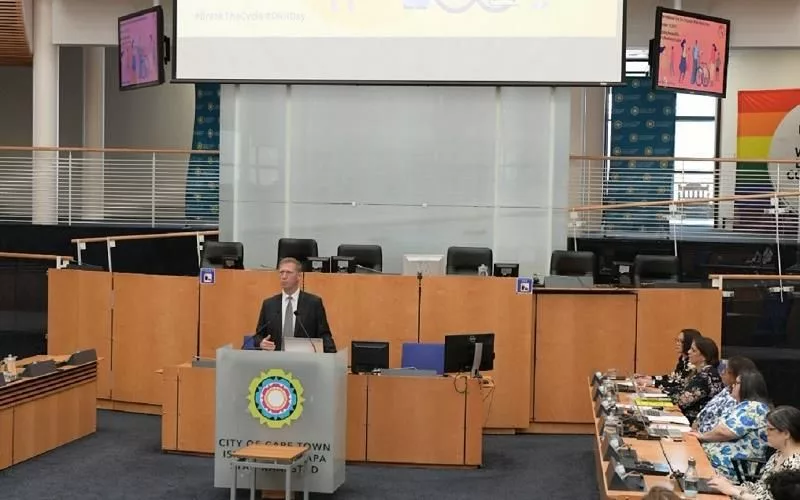The 3rd South Africa-Namibia Bi-National Commission brought together leaders from both nations to address shared challenges, strengthen economic cooperation, collaborate on energy security and climate change, and reinforce global governance institutions and multilateralism. Notable achievements include auditing legal instruments, enhancing investment and trade, and jointly combating terrorism and extremism in Northern Mozambique. Both nations pledge their support for sustainable peace and the reinforcement of global governance institutions and multilateralism. Overall, through cooperation and dialogue, South Africa and Namibia are well-positioned to create a brighter, more prosperous future for their citizens.
What is the 3rd South Africa-Namibia Bi-National Commission about?
The 3rd South Africa-Namibia Bi-National Commission served as a platform for discussing issues impacting both nations, addressing common challenges, and fortifying partnerships. The commission’s notable achievements include auditing legal instruments, enhancing investment and trade, and collaborating on energy security and climate change. Both countries pledge their support for sustainable peace and the reinforcement of global governance institutions and multilateralism.
A Platform for Addressing Shared Challenges
The 3rd South Africa-Namibia Bi-National Commission recently took place in Windhoek, hosted by Namibian President Dr. Hage Geingob. South African President Cyril Ramaphosa attended the event, emphasizing the significance of this structured mechanism for promoting mutual cooperation and a shared vision for the future. The Bi-National Commission serves as a crucial platform for discussing issues impacting both nations, addressing common challenges, and fortifying partnerships.
This gathering occurred amidst global events like the escalation of the Israeli-Palestinian conflict, which deeply troubled both leaders. South Africa and Namibia share an acute concern for the welfare and safety of civilians affected by the crisis, brought about by the disregard for the international, rules-based order. Consequently, both countries have urged an immediate end to hostilities and the establishment of favorable conditions for dialogue.
Thus far, one of the Commission’s notable achievements has been the auditing of legal instruments between South Africa and Namibia. This thorough process guarantees the effective execution of numerous agreements and tackles any potential barriers. Through continuous monitoring, both nations can work towards accomplishing shared goals and overcoming challenges.
Strengthening Economic Cooperation and Energy Security
The topic of economic cooperation was a vital aspect of the meeting. The Business Forum, which took place alongside the Commission, seeks to enhance investment and trade between both countries. The proposed establishment of the South Africa-Namibia Business Council will further fortify this collaboration while exploring various trade and investment opportunities in both nations.
Both countries have expressed a strong interest in cooperating on energy security. Namibia’s invitation to collaborate in the oil, gas, and green hydrogen sectors offers immense potential for job creation, industrialization, and energy security. Additionally, South Africa’s recent hydrocarbon discoveries underscore the necessity for cross-border collaboration on multiple energy projects.
Tackling Climate Change and Promoting Continental Collaboration
South Africa and Namibia must jointly address pressing issues like water security and climate change. The Orange River, for example, plays a crucial role in trilateral collaboration with the Lesotho government for the successful completion of Phase Two of the Lesotho Highlands Water Project. This partnership will help alleviate the adverse effects of extreme weather caused by climate change in the region.
On a continental scale, the African Continental Free Trade Area fosters self-reliance and the sustainability of economic development efforts. Both nations acknowledge the importance of building manufacturing capacity and establishing beneficial regional and continental value chains to counter the harmful effects of extracting raw materials without beneficiation.
South Africa and Namibia also pledge their support for sustainable peace in the region and beyond. Alongside regional partners, both countries actively combat terrorism and extremism in Northern Mozambique and support peace-building initiatives in the Democratic Republic of the Congo. These joint efforts are essential for realizing the Africa We Want, as outlined in the African Union’s Agenda 2063.
Strengthening Global Governance and Multilateralism
The reinforcement of global governance institutions and multilateralism is crucial for achieving this vision. Both nations reiterate their commitment to the reform of the United Nations, particularly the Security Council, and the entire global financial architecture. As progressive internationalists, South Africa and Namibia remain united in supporting the people of Western Sahara in their pursuit of self-determination.
In summary, the 3rd South Africa-Namibia Bi-National Commission signifies a considerable stride forward in building a shared future for both countries. Through cooperation, dialogue, and a profound commitment to internationalism, South Africa and Namibia are well-positioned to surmount common challenges and create a brighter, more prosperous future for their citizens.
What were the notable achievements of the 3rd South Africa-Namibia Bi-National Commission?
The notable achievements of the 3rd South Africa-Namibia Bi-National Commission include auditing legal instruments, enhancing investment and trade, and collaborating on energy security and climate change. Both nations also pledge their support for sustainable peace and the reinforcement of global governance institutions and multilateralism.
What is the purpose of the Business Forum held alongside the Commission?
The Business Forum held alongside the Commission seeks to enhance investment and trade between South Africa and Namibia. The proposed establishment of the South Africa-Namibia Business Council will further fortify this collaboration by exploring various trade and investment opportunities in both nations.
What is the significance of the Bi-National Commission?
The Bi-National Commission serves as a crucial platform for discussing issues impacting both nations, addressing common challenges, and fortifying partnerships. It promotes mutual cooperation and a shared vision for the future.
What issues did the leaders of South Africa and Namibia discuss at the Commission?
The leaders of South Africa and Namibia discussed shared challenges, strengthening economic cooperation, collaborating on energy security and climate change, and reinforcing global governance institutions and multilateralism. They also expressed a strong interest in cooperating on energy security, addressing climate change, and promoting continental collaboration.
What is the African Continental Free Trade Area?
The African Continental Free Trade Area fosters self-reliance and the sustainability of economic development efforts. The initiative aims to build manufacturing capacity and establish beneficial regional and continental value chains to counter the harmful effects of extracting raw materials without beneficiation.
What issues related to climate change did South Africa and Namibia address at the Commission?
South Africa and Namibia must jointly address pressing issues like water security and climate change. The Orange River, for example, plays a crucial role in trilateral collaboration with the Lesotho government for the successful completion of Phase Two of the Lesotho Highlands Water Project. This partnership will help alleviate the adverse effects of extreme weather caused by climate change in the region.
What joint efforts are South Africa and Namibia making for sustainable peace?
South Africa and Namibia pledge their support for sustainable peace in the region and beyond. They actively combat terrorism and extremism in Northern Mozambique and support peace-building initiatives in the Democratic Republic of the Congo. These joint efforts are crucial for realizing the Africa We Want, as outlined in the African Union’s Agenda 2063.
What is the commitment of South Africa and Namibia to global governance and multilateralism?
South Africa and Namibia reiterate their commitment to the reinforcement of global governance institutions and multilateralism. They aim to achieve this through the reform of the United Nations, particularly the Security Council, and the entire global financial architecture. Both countries support the people of Western Sahara in their pursuit of self-determination.








